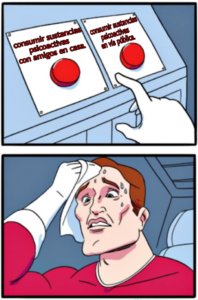By Jorge Herrera Valderrábano and Monserrat Angulo*
As part of the Support. Don’t punish global campaign, several activities took place in Mexico to demand respect for the human rights of people who use drugs. One of them was the Festival Apoye No Castigue, an initiative promoted by young people since 2018 and coordinated by Laboratorio sobre Sociedad, Arte y Drogas (now renamed Conexiones Psicoactivas), ReverdeSer Colectivo and Instituto RIA.
Due to the COVID-19 pandemic, this edition was held virtually with the aim of creating a meeting point and dialogue space between citizens and civil society organizations. Given the incredibly positive response that the Festival has had over the last three years, this year’s edition took place over 16 days. Activities delved into various topics concerning human rights, harm reduction and pleasure management, which are key pillars of the paradigm shift in drug policy promoted by the festival.
An important activity within the Festival was the ‘psychoactive clothesline‘, inspired by the work of Mónica Meyer. The initiative invited people to answer a series of questions on social networks: Have you been arrested for using drugs? How was that experience? Have you had a bad experience when taking substances? Have you lived discrimination against for using drugs? And how has your drug use changed during the contingency?. The results showed people have experienced abuse and extorsion at the time of being stopped and arrested by the police. They also highlighted aspects such as theft and sexual harassment when coming into contact with the illegal market. It also brought to the fore that the main consequences associated with discrimination on the grounds of drug use are dismissals and sanctions in educational institutions.
Likewise, we organized a discussion session on young people who have been in conflict with the law, in which we identified that people who use psychoactive substances are criminalised and targeted by police abuse on the daily in Mexico. Although carrying drugs of an amount lower than an established threshold does not attract criminal penalties, people who use drugs remain at the mercy of police arrests, after which they are brought in front of a judge, who is in charge of determining the penalties, or lack thereof. This situation paves the way for extorsion and human rights violations by law enforcement operators. The discussion was guided by a lawyer from an allied organization, who provided resources people could utilise when in conflict with the authorities or the law.

Work by Zurisadai Rodríguez (22 years old), one of the winners of the III Support. Don’t Punish Festival meme contest
The Festival also shared resources to confront prohibitionism through home-growth and extraction workshops, and spaces to share strategies of care in relation to the use of psychoactive substances, specifically psychedelics. We shared information about a range of health services orientated toward the management of pleasure in nightlife and party settings, as well as developments in terms of psychoactive resistance and other intersecting movements.
The III Support. Don’t Punish festival was structured around some 40 activities organized in thematic blocs: Prohibitions and human rights violations; harm reduction and pleasure management,; cannabis: uses, production and regulation; activism and psychoactive resistance. Each one of the activities, which included panels, talks and contests, were broadcast and open access. Specialists from the health, security and justice sectors joined in from national organizations, such as Espacio Progresista and Movimiento de Diversidad Progresista; regional initiatives, such as Catalyst and the Latin American Network of People who Use Drugs (LANPUD); and international organizations, such as Energy Control.
In general, the Festival allowed us to explore novel ways to organise, demonstrate and mobilise through digital platforms, despite the pandemic situation. This initiative allowed us to exchange knowledge with different organizations that advance drug policy reform worldwide. We met great allies and learned together about new developments in relation to a broad range of topics. And the digital format allowed us to weave networks of solidarity and friendship with colleagues in different latitudes, while expanding the reach of our message.
In commemoration of International Youth Day, we recently launched a survey on drug policy and political participation. And, on 12 August, we will hold the first session of our psychoactive film series, with the film “Kenke”, which narrates the story of a young person who smokes cannabis and faces a series of problems with his family and school due to prejudice, stigma and misinformation. Likewise, at the end of the month we will organise the first in a series of workshops on psychoactive substances and drug policy aimed at young people between 15-27 years old. To register and follow our work, please follow us on social media.
* Jorge Herrera Valderrábano has a B.A. in International Relations from the Tecnológico de Monterrey, and is studying a second major in Social Work at the National Autonomous University of Mexico. He is the cofounder of Instituto RIA, an organization doing research and advocacy to highlight innovations in drug policy with a social justice focus.
Monserrat Angulo studied Sociology at the Facultad de Estudios Superiores Acatlán. She is an activist and collaborator of various projects related to drug policy and risk and harm reduction. She currently works at ReverdeSer Colectivo, a civil organization that seeks to transform peacebuilding policies from a full spectrum perspective.